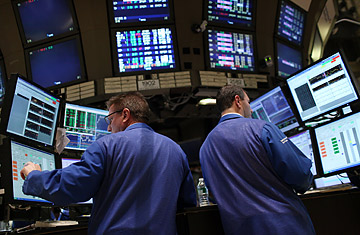
Traders on the floor of the New York Stock Exchange
(2 of 2)
In terms of the economy, with oil up is potential inflation a concern?
When you look at the overall level of unemployment and underemployment together, we have roughly a 17% unemployment rate. We have an industry manufacturing-capacity utilization rate of 70%; in other words about a third of manufacturing capacity is sitting idle. And in shopping-center space there's a vacancy rate of over 10%. There is excess supply of labor, there is excess supply of homes, there is excess supply of strip malls, there is excess supply of manufacturing plants. How do you get inflation out of that?
So rising commodity prices don't worry you?
Commodities are going up for the same reason they were going up four years ago, which is related to China's voracious demand for raw material. Is that a source of inflation? The answer is yes. If it was happening in the context of a 4% unemployment rate [in the U.S.] and a 95% capacity-utilization rate and broadly based price increases in finished goods and services, I would be worried about inflation. But that's not the case.
Commodity prices are going up but it's just one part of the overall story and it's certainly not strong enough to upset the deflationary forces that are still under way in residential real estate and credit and in the labor market.
From that can one extrapolate that you think bonds are a more attractive investment than equities?
At Gluskin Sheff we have been putting our clients continuously over the past year and a half into corporate bonds. If you identify good companies that will survive, then there's nothing wrong with clipping that coupon. I think that in a deflationary environment, income is king, and I'm not just talking about bonds. You can spin off the income stream from other assets, even from the equity market, which is why we've been big proponents of dividend growth and dividend yield.
As for the stock market, in the context of a credit collapse we are in the grips of a very powerful deflationary undertow that may not be evident to the naked eye. But we are in a deflationary episode, and the stock market is going through a major countertrend rally.
So the Dow's big rise is just a bear-market rally?
I've got news for you: we saw this in Japan repeatedly. Japan has put together 260,000 rally points in the Nikkei over the past two decades, and it's still down 70% from the peak.
Take a look at the volatility of the 1930s. You had a huge countertrend rally in 1930 and the answer was, No, we actually weren't completely out of the woods. Today, it's still a very fragile situation.
Is it fair to say that the market lows of 2009 are now behind us for good?
I think we are going to have a retest of the lows. Whether we break below the lows remains to be seen. Even if you're bullish on this market, we're going to have to get confirmation. This thing has just been a parabolic move up, not built on a lot of good news unless your story is that things are relatively better than they were a year ago. A lot of this has been short covering. A lot of it's been momentum.
There are different things that will influence the stock market at any given moment. But the same people who say, "We're are not going to go to a new low, I will tell you," are the same people who said, "We're not going to retest the October '02 lows." Sure enough, as night follows day, in the next recession we did break to a new low. And I believe that in the next recession, we will break to a lower low.
The next recession? When's that?
I don't have a lot of visibility on that, nor am I confident enough to call for a double-dip recession this year. But what typically happens after a credit collapse and an asset shock like the one we endured is that recessions tend to come together more quickly. This is not going to be a lucky situation where we have recessions separated by 10 years. The next recession's going to happen more quickly. And I believe that in that next recession the market will see new lows. This is not 1982.
